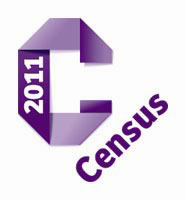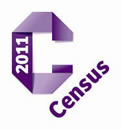The 2011 Census
What it means for you & your community
In March and April, 35,000 census field staff will be taking to the streets to offer assistance to, and collect questionnaires from, residential households and communal establishments in your community. They will be working for the Office for National Statistics which runs the 2011 Census in England and Wales. This fact sheet is to help you understand which census teams will be working when.
What is the census?
The census is the one source of statistics that looks at everybody in England and Wales. The census has collected information about the population every ten years since 1801 (except in 1941). Everyone is asked the same questions about one day – 27 March – in order to take a snapshot of the population at one moment in time. The census tells us how many people live where and the types of people they are (young, old, married, single): their characteristics. This means decisions, like working out who needs facilities in the future, are focused on accurate, relevant details.
Census statistics are used by government, local authorities, health providers, commercial businesses and other users to develop their policies and plan services effectively. This includes water pipes into and out of houses, car parking spaces at supermarkets, location of bank branches, and allocation of funding from central government for facilities and services like school places, healthcare and transport.
The Office for National Statistics (ONS), are sending a census questionnaire to every household to arrive in mid-March. Householders can complete online or return their paper questionnaire via prepaid post. The ONS have an address register which lists all households. When they get a completed questionnaire back, they tick the household off the list. That way, come 6 April when the census collectors start visiting households who haven’t returned their questionnaire promptly, the ONS make sure they are only going to non-responders.
Completing a census questionnaire is compulsory, the few who refuse may be prosecuted and face a fine of up to £1,000, but this is a last resort.
The census field operation runs from March to August
Census day is on Sunday 27 March 2011, although people can complete their questionnaires before, on or after that date. The ONS will have the majority of their field staff out and about from mid-March until mid-August; you can request details from your area manager about what’s happening locally.
Identifying census field staff
 Census field staff will always carry their photo ID, bearing the 2011 Census and ONS logos (left), and they should automatically show it to residents. The staff will do everything they can to reassure people and will not try to prevent anyone from checking their identity.
Census field staff will always carry their photo ID, bearing the 2011 Census and ONS logos (left), and they should automatically show it to residents. The staff will do everything they can to reassure people and will not try to prevent anyone from checking their identity.
When they visit an address, collectors will introduce themselves, show a census ID card, and explain they are from the census. Their primary aim is to take a completed census questionnaire away with them. They may also ask for the name of the person they are speaking to, whether that person is usually resident there and for the number of usual residents.
Collectors should never enter the household unless they are asked to do so. Collectors may need to make several visits to the same address to make sure a questionnaire is returned.
Collecting from residential households (21 March – 6 May)
Collectors will be working at different times of the day and evening, seven days a week. Most of the collectors start on 6 April, but some early collectors will be visiting communities where extra assistance may be required in advance, such as translated guidance. The majority of collectors will be working by themselves.
Collecting from communal establishments (7 March – 16 April)
Communal establishments, such as care homes, hotels, halls of residence, boarding schools and hotels, will have their questionnaires hand delivered, as will Gypsy and Traveller sites, caravan parks and marinas. A special enumerator will work with the manager of the establishment and agree a date and time to pick-up the completed questionnaires. The special enumerator will enter the premises to speak to the manager, but will not necessarily speak to the residents (unless specific help is needed). The majority of special enumerators will be working by themselves.
Checking the extent of the census’s reach (9 May – 2 June)
Census Coverage Survey staff will be visiting about 300,000 addresses to conduct a brief doorstep interview. The households will be aware in advance that they will be contacted. Again, coverage survey staff will not enter the property unless invited to by the resident. The staff will be working in pairs and independently.
Checking the quality of the census statistics (23 May – 19 August)
Census Quality Survey staff will be making pre-arranged visits to over 7,000 households and will enter premises as arranged with the householder. The majority of survey staff will be working by themselves.
Contacting those who refuse to complete their questionnaire (26 April - 12 August)
Census officers will visit households who have refused to complete their questionnaire and encourage them to do so, prior to the onset of an investigation phase. Census officers will work in teams of two, and will conduct interviews on the doorstep.
Local authorities, national organisations and community groups across England and Wales have volunteered to host census completion events, to offer assistance and support to people completing their questionnaires. Some of these events are being run with ONS support, some are taking place independently. Details are available from area managers.
The 2011 Census purple bus (21 February – 4 March and 17 March – 4 April)
The purple bus will be visiting cities to offer assistance with completing questionnaires – stationed in a high footfall public area. It will be manned by census field staff and will be widely publicised. There is likely to be a high level of press interest, but not increased numbers of people in any given area. Police forces and other relevant parties will be contacted by a census team if it impacts on them.
If you are concerned about people knowcking at your door please be aware that:
• residents who return their completed questionnaires promptly (before 6 April) will not be contacted by the census field staff
• all census staff will carry an ID card with a photo, logo and hologram. They may ask for name and number of residents, but they will not ask for specific details (like credit card details, bank accounts etc)
• residents will not be asked to leave their questionnaire on the doorstep for collection
• residents can request a pre-arranged appointment with a collector, via the census helpline number (on the front of their questionnaire)
• close the door if unsure. Phone the census helpline England: 0300 0201 101, Wales: 0300 0201 130 or check online for more info: www.census.gov.uk
Related links
|
